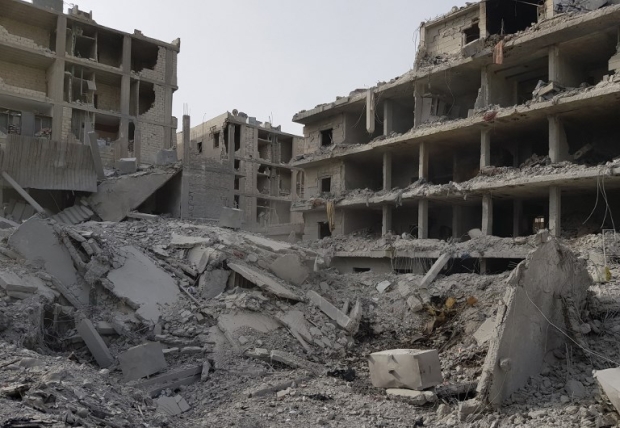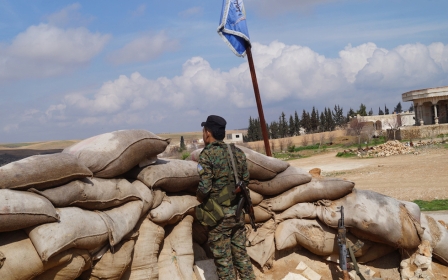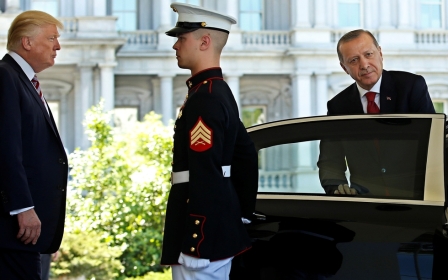After victory in Afrin, a Turkey-US confrontation looms in Syria

Ever since the Syrian civil war began almost exactly seven years ago in March 2011, Turkey has chased the goal of becoming a major player in Syria, even though its initial dreams of overthrowing President Bashar al-Assad and replacing him with a Sunni-led administration have faded.
Now, at least in its own eyes, that moment has finally arrived. On Sunday, after an eight-and-a-half-week campaign, Turkish and Free Syrian Army (FSA) forces entered Afrin city, enabling President Recep Tayyip Erdogan to claim victory on the anniversary of an earlier Turkish victory at Gallipoli in World War One. "We have given a lesson to the world," proclaimed Star, a leading pro-government paper, on Monday morning.
Increased military strength
There are certainly grounds for satisfaction with the military operation compared with its 2016 predecessor. The Afrin operation went more smoothly and with fewer losses of soldiers than the earlier military intervention, Operation Euphrates Shield, which took the towns of Jarablus and al-Bab.
Resources poured by Ankara into military planning and Turkey's arms industry seem to be paying dividends in creating a successful fighting force.
It seems equally clear that Turkey's strategic superiority, at least against the Syrian Kurds of the PYD (Democratic Union Party, denounced by Ankara as a terrorist movement) and its militia, the YPG (People's Protection Units) has been firmly established. Afrin had long been preparing for a Turkish invasion, but intense preparations and fortification by the YPG did not hold Turkish forces for long.
Continuing Russian support for Turkey as it moves to crush the PYD may also be sufficient to unpick Turkey’s seven-decade military alliance with the US and create instead a long-term Turkish-Russian strategic partnership
When the surrounding province was lost and the town almost surrounded, instead of holding out in a siege of the town, its defenders decided not to make a stand against Turkey. About 10,000 of its Syrian Kurdish defenders quickly withdrew, presumably in order to be available to fight against Turkey elsewhere. Some 1,500 fighters were killed, according to a war monitor.
They will have heard Erdogan's repeated statements that the Afrin campaign may be only the first in a series of blows aimed at breaking the power of the PYD in the line of autonomous enclaves in northern Syria.
Though this is a very long area, much is low-lying and would pose fewer challenges for a Turkish expeditionary force than the mountainous countryside around Afrin, so a series of piecemeal attacks against key cities could put a stop to the autonomous enclaves and create a Turkish zone of influence along the border.
Turkey's increased military strength, however, does not derive simply from its experience and improved preparations. In both this intervention and its 2016 predecessor, Turkey was able to send troops into Syria only because Russia permitted it to do so. Moscow was also apparently restraining Assad's planes from intervening, while blocking any attempt by Damascus at a rapprochement with the Kurds.
Continuing Russian support
If the pact between Ankara and Moscow were to fail, then Turkey's presence in Syria might not be sustainable for long. But there is no sign that Moscow will renege on its friendly attitude towards Turkey and Erdogan.
Russian President Vladimir Putin seems to have decided to give Turkish forces a free hand to strike against the Kurdish administration of Afrin, a decision that suggests he will probably also be willing to see Turkish forces attack and attempt to break up the larger Syrian Kurdish enclaves to its east.
In Russian eyes, this will be retribution for the close alliance that exists between the Syrian Kurds of the PYD and the United States, forged in their common struggle to crush the Islamic State (IS).
Though the Afrin campaign has generally attracted little media attention in Western countries compared with other fronts in the Syrian war, it has received enormous attention in Turkey. Not since Turkey's troops entered Cyprus in July 1974 has there been anything quite like it, with some Turks seeing the Afrin operation as a revival of the lost glories of the Ottoman Empire in the Middle East.
Nevertheless, Turkey's main reason for attacking Afrin was practical: breaking the power of the PYD and the Kurdish separatist movement, which it regards as terrorist because of its connections with the Kurdistan Workers' Party, the group, now largely crushed inside Turkey, that has been campaigning violently against Turkish rule since 1984.
The Turkish public seems to have endorsed the invasion precisely because it believes that it promises a final end to the PKK and its attacks. However, this is a little difficult to judge, as opponents of the fighting - especially Turkish Kurdish ones - have been largely silenced and hundreds of people arrested for expressing their opposition on social media.
A choice between betrayal or hostilities
Turkey's plans for Afrin rule out any kind of annexation, but involve the "return of its rightful inhabitants". It will probably have an interim arrangement run by local FSA groups, along the lines of what was set up in Jarablus. Its sights will be mainly concentrated on a continued military campaign, perhaps in Kurdish-held border towns such as Tal Abyad.
Before its forces can proceed very far to the east, however, Turkey faces a roadblock that it must remove: the presence of about 2,000 US soldiers at Manbij fighting alongside the YPG and the Syrian Democratic Forces (SDF).
In the middle of last month, former US Secretary of State Rex Tillerson visited Ankara and seems to have agreed to allow Turkey to move into Manbij, too, though the exact details have not been revealed. But Erdogan and Turkish opinion would not be content merely with Manbij, and in any case, Tillerson has since lost his job.
In essence, the US faces an invidious choice between either betraying its allies in the successful coalition against IS combined with an ignominious withdrawal from Syria, leaving the country to the Russians, Turks and Iranians; or else risking some actual hostilities with Turkey, a threat that cannot be taken lightly after some of Erdogan's warnings.
Washington's mood seems to be changing. On Monday, spokesmen for both the State Department and Department of Defense issued statements at odds with Turkish policy, with the State Department expressing "deep concern" about the Afrin offensive and highlighting reports of looting.
This was swiftly followed by a firm denial from Turkey that any civilians in Afrin had suffered. It looks increasingly as though a Turkish-American confrontation in Syria, egged on by Russia, is looming. Its outcome will have a powerful bearing on the future role of the US in Syria.
- David Barchard has worked in Turkey as a journalist, consultant and university teacher. He writes regularly on Turkish society, politics and history, and is currently finishing a book on the Ottoman Empire in the 19th century.
The views expressed in this article belong to the author and do not necessarily reflect the editorial policy of Middle East Eye.
Photo: A Turkish-backed Syrian fighter drives past a burning shop in the city of Afrin in northern Syria on 18 March 2018 (AFP)
New MEE newsletter: Jerusalem Dispatch
Sign up to get the latest insights and analysis on Israel-Palestine, alongside Turkey Unpacked and other MEE newsletters
Middle East Eye delivers independent and unrivalled coverage and analysis of the Middle East, North Africa and beyond. To learn more about republishing this content and the associated fees, please fill out this form. More about MEE can be found here.






